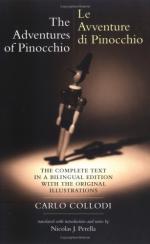“Three fields off from here there lives a gardener called Giangio, who keeps cows. Go to him and you will get the milk you are in want of.”
Pinocchio ran all the way to Giangio’s house, and the gardener asked him:
“How much milk do you want?”
“I want a tumblerful.”
“A tumbler of milk costs five cents. Begin by giving me the five cents.”
“I have not even one cent,” replied Pinocchio, grieved and mortified.
“That is bad, puppet,” answered the gardener. “If you have not even one cent, I have not even a drop of milk.”
“I must have patience!” said Pinocchio, and he turned to go.
“Wait a little,” said Giangio. “We can come to an arrangement together. Will you undertake to turn the pumping machine?”
“What is the pumping machine?”
“It is a wooden pole which serves to draw up the water from the cistern to water the vegetables.”
“You can try me.”
“Well, then, if you will draw a hundred buckets of water, I will give you in compensation a tumbler of milk.”
“It is a bargain.”
Giangio then led Pinocchio to the kitchen garden and taught him how to turn the pumping machine. Pinocchio immediately began to work; but before he had drawn up the hundred buckets of water the perspiration was pouring from his head to his feet. Never before had he undergone such fatigue.
“Up till now,” said the gardener, “the labor of turning the pumping machine was performed by my little donkey, but the poor animal is dying.”
“Will you take me to see him?” said Pinocchio.
“Willingly.”
When Pinocchio went into the stable he saw a beautiful little donkey stretched on the straw, worn out from hunger and overwork. After looking at him earnestly, he said to himself, much troubled:
“I am sure I know this little donkey! His face is not new to me.”
And, bending over him, he asked him in asinine language:
“Who are you?”
At this question the little donkey opened his dying eyes, and answered in broken words in the same language:
“I am—Can—dle—wick.”
And, having again closed his eyes, he expired.
“Oh, poor Candlewick!” said Pinocchio in a low voice; and, taking a handful of straw, he dried a tear that was rolling down his face.
“Do you grieve for a donkey that cost you nothing?” said the gardener. “What must it be to me, who bought him for ready money?”
“I must tell you—he was my friend!”
“Your friend?”
“One of my school-fellows!”
“How?” shouted Giangio, laughing loudly. “How? had you donkeys for school-fellows? I can imagine what wonderful studies you must have made!”
The puppet, who felt much mortified at these words, did not answer; but, taking his tumbler of milk, still quite warm, he returned to the hut.




